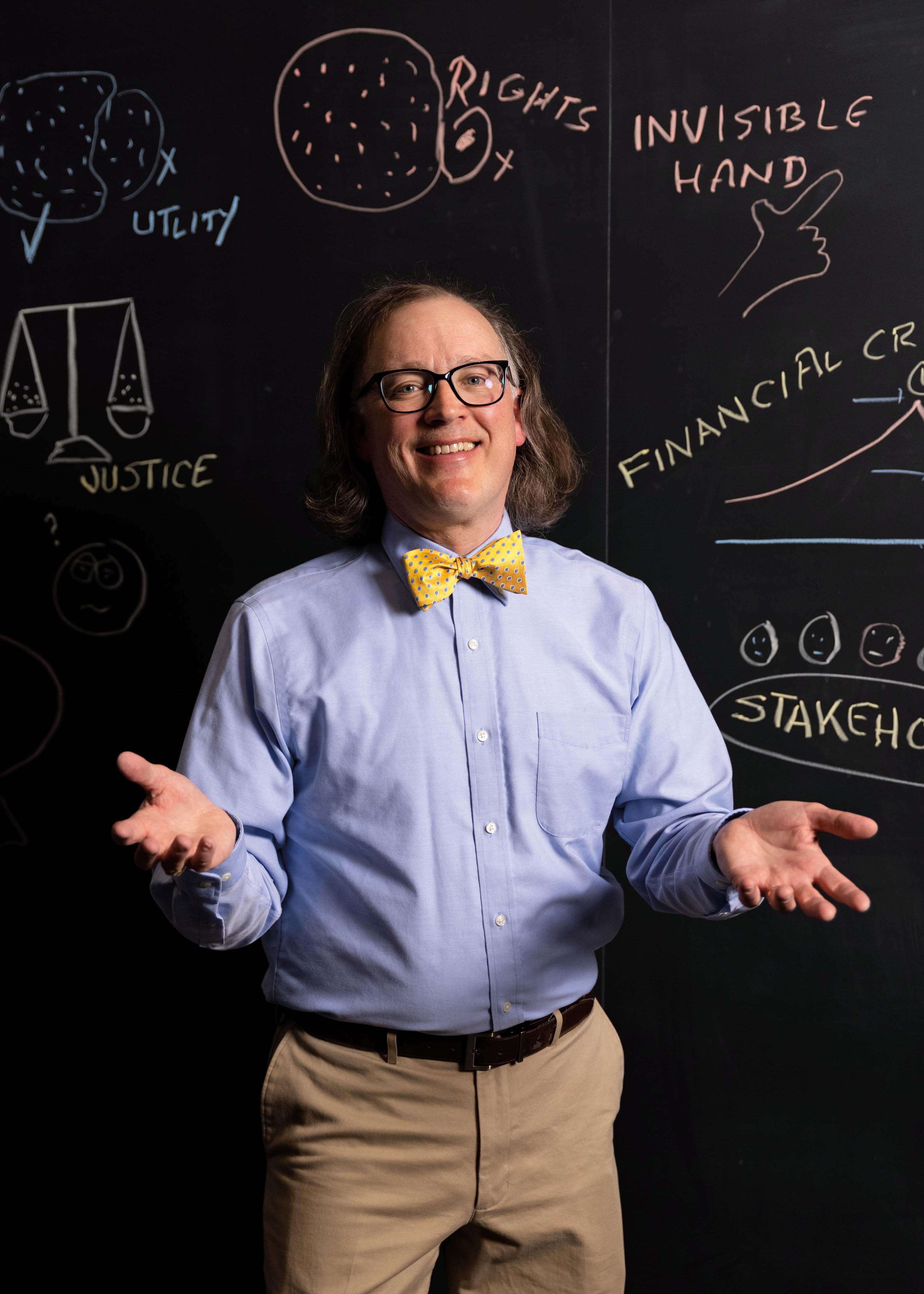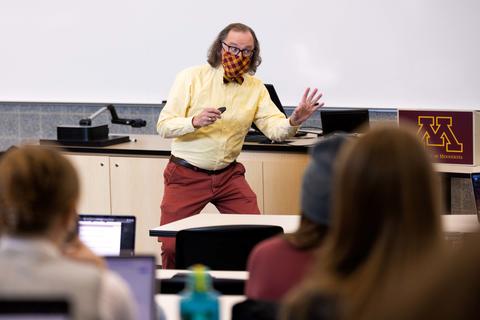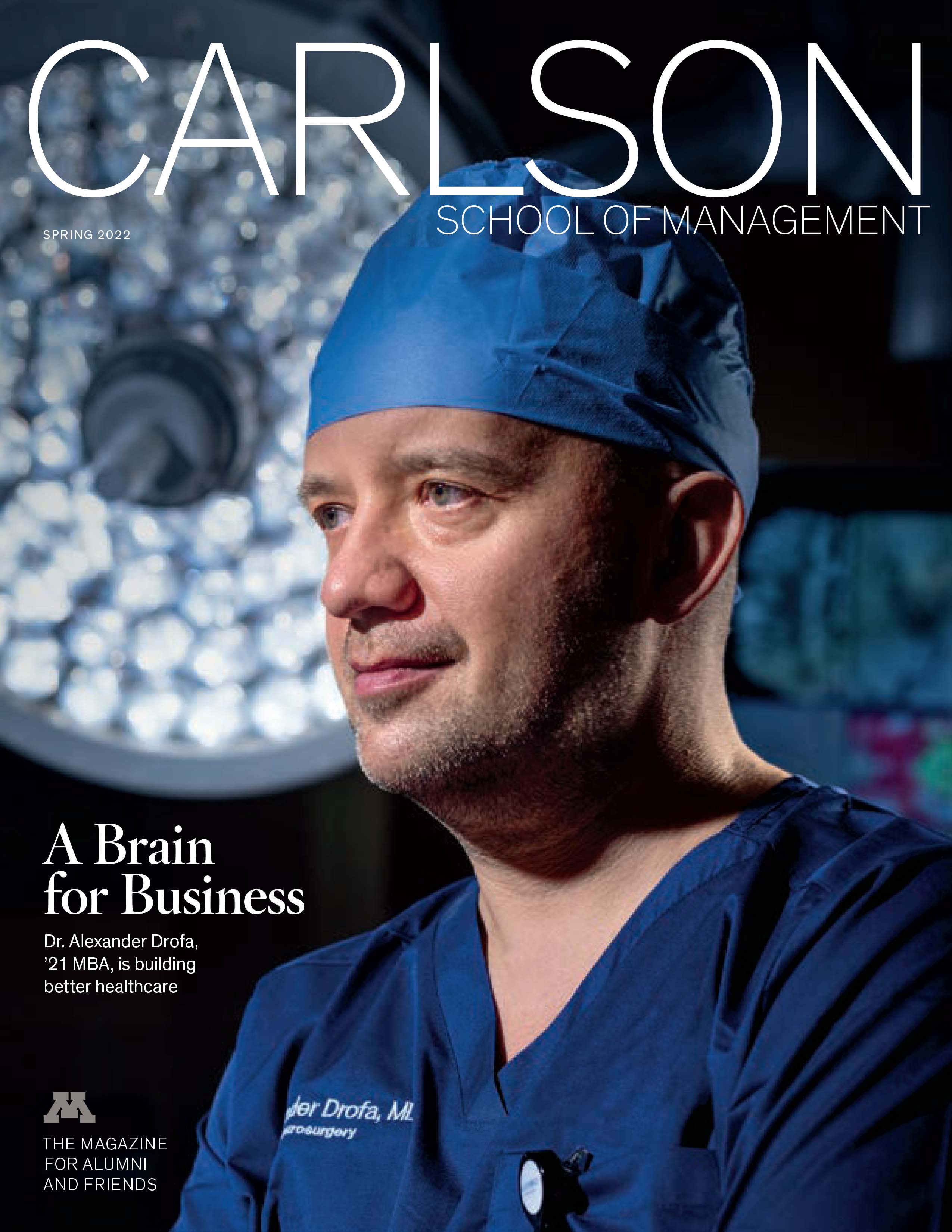
Senior Lecturer Rand Park Injects Energy, Style Into Teaching
Friday, April 8, 2022
BY KATIE DOHMAN
Stylish Carlson School Senior Lecturer Rand Park wraps his teaching prowess and compassion into one big gift.
It is almost finals week, and the semester break is beckoning. The first blasts of cold are gusting across campus. The headlines shout COVID-19 is bad. Again.
Carlson School Senior Lecturer Rand Park appears completely undeterred. He bounds into the classroom 10 minutes ahead of his first section of MGMT 1005: Corporate Responsibility and Ethics, wearing a pale yellow Oxford button-down shirt, a maroon-and-gold barbershop-stripe bow tie, and a Goldy Gopher-themed face mask, wavy gray hair flowing over the top of his backpack.
For the next hour and a half, he delivers a rapid-fire, straight-talking multimedia tour de force—including a choice Seinfeld mention—highlighting the landmark Betty Dukes and Lois Jenson sexual harassment cases,
covering at-will employment law, and sexual harassment in the workplace. Everyone’s laptops are open, but no one is shopping or playing games—they’re focused on the PowerPoint slides he makes available before class.
He dismisses the class, wipes the now-full whiteboard clean, and does it all again for a second section minutes later, with no discernible dip in purpose or energy.
Park has been teaching multiple sections of this required class, sometimes year-round, for nearly a decade. By his own, and most others’ estimation, that’s a long time to carry that many students through a topic that might seem like a drag.
But Mary Benner, department chair of Strategic Management and Entrepreneurship, says that it’s exactly this opportunity that likely invigorates him.
“That is a tremendous responsibility, shaping our undergraduates to be part of ‘business as a force for good,’” she says. “I suspect Rand gets energy from shaping how students learn, challenging them, and facilitating their understanding of business and ethics. … And, of course, Rand does an outstanding job.”
Stephen Parente, professor of Finance, says he’s witnessed Park’s commitment through several roles within the school, and he’s shone in all of them. “It takes tenacity, passion, and steadfastness. But you don’t do it if you don’t love it. That’s the key.” And Parente concurs with Benner: Park’s got it in spades.
The son of a reference librarian and community banker, Park says he puts a lot of effort into making the lectures relevant and colorful, but never has to fake the enthusiasm. “‘I love your energy’ is something I hear a lot,” he says. “But, like, I hate sitting in a classroom where the professor looks like they’re having laparoscopic surgery … if you don’t care about it, why should I?”
As a result, he’s been acknowledged by his peers for his outstanding results, racking up a mittful of teaching awards: 2014 and 2017’s Undergraduate Faculty of the Year, the 2019 Executive MBA Curtis Cup Faculty of the Year, and the 2021 Outstanding Teaching Award.
The proof is in the student pudding, too, as his near-perfect RateMyProfessor ratings reflect, studded with reviews like this one: “This guy is truly the bee’s knees …. This dude does it all. Definition of a beauty GOAT. Can’t say enough fantastic things about this man.” Or, “Rand Park and his 1005 class is amazing. He takes a potentially dry topic like Business Ethics and makes it dynamic, interesting, and applicable to everyday life and future careers. His lectures are like TED Talks—you’ll never look at the clock and then be surprised when the class is over. Definitely one of the best at Carlson.” Reviews are tagged with adjectives like “caring,” “inspirational,” “respected,” and “hilarious.”
“‘I love your energy’ is something I hear a lot. But, like, I hate sitting in a classroom where the professor looks like they’re having laparoscopic surgery. If you don’t care about it, why should I?”
The Peripatetic Path
Park says his sister, who has an MBA from University of North Carolina at Chapel Hill and works in treasury management, likes to tease him about sneaking onto his ivory perch, because he didn’t go to business school.
But he’s no educational slouch: He’s earned a BA and an MA in literature from the University of Georgia, a JD from the now-Mitchell Hamline School of Law, and a PhD from the University of Minnesota in organizational leadership, policy, and development. He’s been teaching on and off since he was offered a TA role at Georgia.
And he finds a lot of parallels in business ethics to his literature studies: “There are villains and heroes and the story builds and there’s an epiphany along the way, and consequences. An unheralded person works really hard and good prevails or not—it could be a comedy or tragedy—but it really has all those elements in what I loved studying about lit, and it’s even more relevant because it’s real! It’s happening! In real time!”
Plus, as he says of his work experience, “I’ve seen a lot of shit.” As a public finance banking associate, as an attorney (he passed the bar and realized very quickly he wasn’t interested in practicing law), and in corporate institutional giving within the Carlson School, among other roles.
The marriage of his professional experiences and education experiences help shape how he approaches his classes today. For example, he acknowledges that business ethics can easily turn into a “parade of horribles,” so he makes sure about half the class material is positive. And he constantly is looking for zeitgeist-y examples to keep topics feeling relevant to current students.
Recently, he swapped one Silicon Valley tech founder, Elon Musk, for another, Theranos’ Elizabeth Holmes. “I thought, this really could be relevant, she dropped out when she was 19 and became an entrepreneur … so, for the last week of class, I chopped off [Musk] and did a whole new case: Elizabeth Holmes.”
The Rand Brand
In part inspired by a midlife crisis, another by a general feeling that higher ed’s sartorial sense could use a nudge, and his mother, he challenged himself when he turned 50 to do something differently and well. So, after a lifetime of private schools and corporate jobs, he grew out his hair, took off his straight necktie, and turned to YouTube to learn how to tie a proper bow.
When they started garnering comments, he realized he was making a mark. “It gave me an identity. … It’s OK to have a little theater. It helps me get my mind right. If I put on my Oxford shirt and tie my bow tie, I’m ready to go. I feel like Professor Rand. It’s a state-specific attitude and energy.”
But, he says, while he has an appreciation for the performance aspect of his job, it’s 100 percent himself up there. “Students can smell BS a mile away,” he says. “If you’re faking it or putting on airs, or doing anything that’s not who you really are, it gets in the way.”
“Students can smell BS a mile away. If you’re faking it or putting on airs, or doing anything that’s not who you really are, it gets in the way.”
Making Sure the Kids are all Right
Another frequent theme among reviews is that Park “really cares” about his students.
He’s shepherded them through a lot, knowingly and unknowingly. He was particularly touched by a former student, Nate Taye, ’21 BSB, who became a Poets&Quants Best and Brightest. He also earned the 2021 Tomato Can Loving Cup, the most prestigious honor bestowed on an undergraduate student. Taye mentioned in his interview that Park’s class was a standout.
Taye initially felt like an outsider, and wasn’t sure he’d stay enrolled. Park remembers him as a “back-row but highly-engaged student who made [his] job easy.” Taye told Poets&Quants that Park’s genuine interest in him boosted his confidence. “It was unbeknownst to me. I wasn’t trying to do anything extraordinary. I don’t claim any great insights,” Park says. “It was the simple fact that I listened and engaged with him and showed up every day—turns out, that’s a significant reason not to drop out of school … it comes down to consistency, availability, and authenticity.”
He notes that his current classes still have a “low hum of concern” when it comes to safety as COVID wears on. “But kids are showing up,” he says. “Especially given current times, I want to be there for the kids who
will be there. You’re going to show up? I’m going to be there for you.”
And that also means he’s willing to show up in new ways to accommodate the world they’ve been thrust into.
Past work experience with designing online learning was great prep for the lockdown transition. Benner, the department chair, says he went around campus and took photos of the buildings so students would feel a part of the places where they’d normally be. He made tests open book—but shuffled questions and made them so rigorous that even putting up “one hell of a scavenger hunt” wouldn’t be doable within the allotted time. And he has hung onto some of the features he adapted for online learning with the return to in-person classes, such as giving students his slides up front.
He says a partner at Deloitte validated his teaching choices. “He told me he didn’t want a young audit associate who simply relied upon memory. He wanted a pro who would see a question, have a question, and know where to look for the answer.”
“Some people hold fast to the old ways and are overly concerned about the academic rigor, like we can’t be so flexible and have to be the Guardians of the Whatever,” he continues. “You can take that approach, or you can be like, ‘We’re all dealing with this.’ … If I want my class to succeed, I have to do everything I can to lower the barriers, but it doesn’t mean give up!” And he acknowledges his privilege as a white middle- aged man—in the end, he’s working hard to make his classroom more equitable, not perpetuate gaps, because as he says, he’s preparing students for a life where there isn’t a rule book to consult, and there are some big decisions ahead.
“We’re taking a messy, complicated world and … you want to be a thoughtful, reflective person. You need the intellectual tools and perspective to stop and breathe and think and not just act on a first impulse.” He rattles off a heavy list of factors—human rights, sustainability, economic viability, social and environmental impact—that all of this decision-making affects. “It’s not empty rhetoric, it’s real … it’s about doing good and doing well.”


